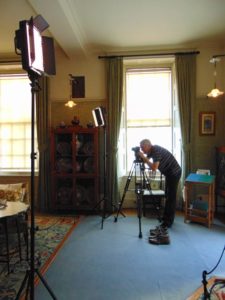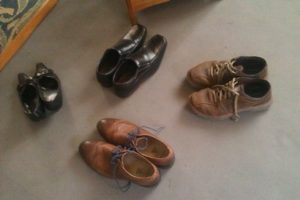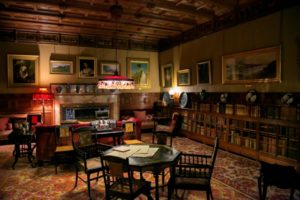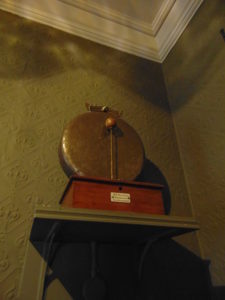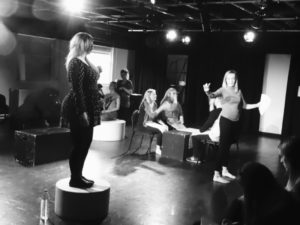
Work on our history of electricity musical has now begun in earnest, and the final year theatre and performance students in the School of Performance and Cultural Industries (PCI) are putting a lot of time into writing the script and song lyrics, composing the music and choreographing the dance scenes, as well as designing a period-appropriate set. There are 24 students in all and they supervised by Dr. George Rodosthenous (Associate Professor in Theatre Directing) and Dr. Tony Gardner (Lecturer in Performance Processes & Techniques).
Having given them material to read over the summer I went to see them at the beginning of their project a couple of weeks ago to talk to them about our work and how they might think about adapting it for the stage, especially given my recent experience working with other drama students to produce our Light Night performance. They have a blog, which you can visit for news, photos and podcasts about the development of the production. They’re also on Twitter: @ElectrifiedPCI.
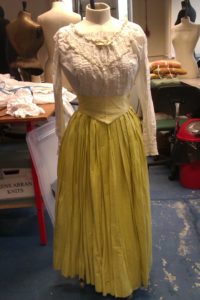
Although working with drama students wasn’t something we originally envisioned being a large part of this project, our collaborations in this area have nevertheless produced some of our most innovative and creative outputs. We have developed a very good working relationship with our colleagues in the School of PCI, George Rodosthenous and Tony Gardner, and have found the students very enthusiastic to take part in other opportunities to dramatise our project materials. As a result, our dramatic outputs have now expanded to include – as well as the musical – our Light Night performance, guide characters for our KS2 history of electricity digital interactive, and a short film we will shoot at Lotherton Hall in December. The students have also taken it upon themselves to organise an educational workshop at the University for local school children at which they will perform sections of the musical.
Our digital interactive is currently being built by our technical officer, Corey Benson. It will benefit from the involvement of the students through the use of green screen filming techniques to insert them into video footage of the houses in order to explain elements of the history of electricity. The interactive itself will comprise floor plans of each of the three partner houses, which pupils will navigate around in the order in which they were electrified (Cragside, Standen, Lotherton Hall). For each house there will be four clickable rooms on the floor plan which pupils can select to learn more about the history of electricity in that particular room. Each house will have a guide character, played by one of the students. These characters will introduce themselves and their respective houses to pupils at the beginning of the interactive, and will then talk to them about specific areas of the history of electricity (science and technology, aesthetics, social history) in videos in each room.
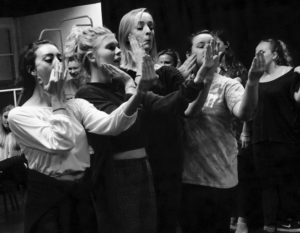
The last dramatic output (for now) is our Lotherton Hall short film. This will be about ten minutes long and will explore what happens when a reporter from a London ladies‘ journal visits the house in the early 1900s to talk to the family and the servants about their new electrical installation. She is concerned in particular with the potential for accidents, especially given the number of people who have been injured or killed by domestic electricity around the country over the preceding few years. I am currently working with a small group of the Electrified students to develop this, and we will film it in Lotherton Hall in December alongside the footage for the digital interactive and the green screen guide characters. The film will be on display at Lotherton Hall for visitors to watch in spring 2016.
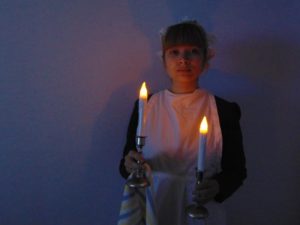
I think these enthusiastic collaborations with staff and students from the School of PCI are due in part to the appeal of the stories and anecdotes Graeme brings out in his book Domesticating Electricity, the source material for the project. These humanising stories of the fears and hopes of the people of the time, and the sometimes amusing, sometimes tragic, accidents or problems they ran into, serve to bring the period to life, and lend themselves well to dramatisation. As we consider the ways in which we might further develop this project in the future, the success and excitement of these dramatic outputs is something which we are very much keeping in mind.
Performances of Electrified will be on Thursday, Friday and Saturday the 10th, 11th and 12th of December at 7:30pm, Stage One, Stage@Leeds. Tickets are now on sale here.
